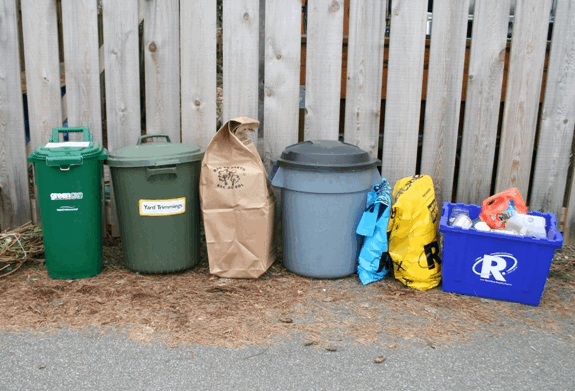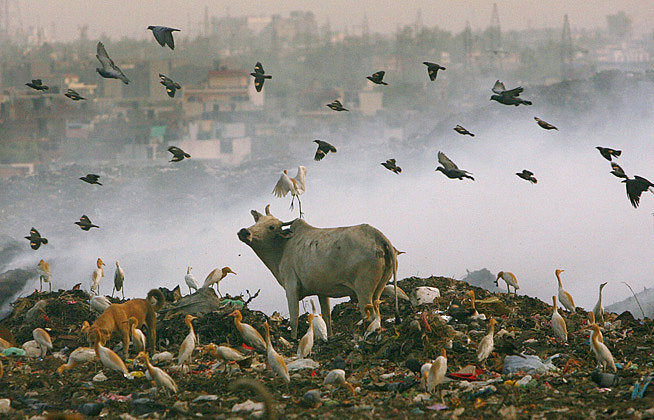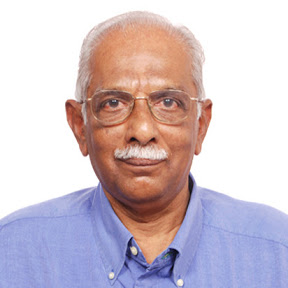Wealth from Waste
All cities and towns struggle to cope with garbage. India is no exception to this phenomenon. Modern life’s activities generate huge amounts of garbage. City governments collect and move the garbage to landfills on the outskirts. As cities expand, the garbage landfills are moved further and further. Garbage has hence to be transported to greater distances. Precious land is lost to garbage dumps. In this generally dismal scenario it is gratifying to see that some cities are not only able to handle the problem quite well, but also create wealth out of garbage.
As the garbage they generate is overwhelming Indian cities, they could learn from the experience of some cities abroad who have successfully cracked the garbage problem. Malmö in Sweden is one such city. Here’s how they do it.
Thousands of households in Malmö sort food waste. The food waste collected is used to produce biogas for vehicle fuel and heating homes. The ‘Turning Torso’, one of Malmö’s apartment complexes, symbolizes the city’s attention to the eco-cycle. Each of the 147 apartments has a garbage disposal unit, which decomposes food and disposes it to a central tank. This organic sludge is used to generate biogas, which in turn is used for home heating. The project was initiated as far back as in 1959. Today a large proportion of the city is connected to one of Sweden’s largest district heating networks. Much of Malmö’s heat energy (65 %) is provided by ‘waste’ sources. Malmö’s entire bus fleet is engineered to run on gaseous energy. The gas is a mix of natural gas and biogas, and sometimes hydrogen too!
Recycling is Malmö’s strength. All Malmö residents separate waste and help recycling it. To help them, the municipal housing company, MKB, has constructed weatherproof complexes (miljöhus) for waste separation in apartments managed by MKB. Each miljöhus has differently coloured containers visibly labeled to recycle glass, newspapers, cardboard, metal, soft and hard plastic and batteries, and other remaining waste. Here is a picture (Figure 1) of differently coloured garbage containers left outside an apartment for collection.
All cities and towns struggle to cope with garbage. India is no exception to this phenomenon. Modern life’s activities generate huge amounts of garbage. City governments collect and move the garbage to landfills on the outskirts. As cities expand, the garbage landfills are moved further and further. Garbage has hence to be transported to greater distances. Precious land is lost to garbage dumps. In this generally dismal scenario it is gratifying to see that some cities are not only able to handle the problem quite well, but also create wealth out of garbage.
As the garbage they generate is overwhelming Indian cities, they could learn from the experience of some cities abroad who have successfully cracked the garbage problem. Malmö in Sweden is one such city. Here’s how they do it.
Thousands of households in Malmö sort food waste. The food waste collected is used to produce biogas for vehicle fuel and heating homes. The ‘Turning Torso’, one of Malmö’s apartment complexes, symbolizes the city’s attention to the eco-cycle. Each of the 147 apartments has a garbage disposal unit, which decomposes food and disposes it to a central tank. This organic sludge is used to generate biogas, which in turn is used for home heating. The project was initiated as far back as in 1959. Today a large proportion of the city is connected to one of Sweden’s largest district heating networks. Much of Malmö’s heat energy (65 %) is provided by ‘waste’ sources. Malmö’s entire bus fleet is engineered to run on gaseous energy. The gas is a mix of natural gas and biogas, and sometimes hydrogen too!
Recycling is Malmö’s strength. All Malmö residents separate waste and help recycling it. To help them, the municipal housing company, MKB, has constructed weatherproof complexes (miljöhus) for waste separation in apartments managed by MKB. Each miljöhus has differently coloured containers visibly labeled to recycle glass, newspapers, cardboard, metal, soft and hard plastic and batteries, and other remaining waste. Here is a picture (Figure 1) of differently coloured garbage containers left outside an apartment for collection.
Some cities set rules for curbside garbage collection Vancouver is one such city. A few of its laws are outlined below.
Pick-up Times

Garbage, recycling, green cans and yard trimmings must be at the curb not earlier than 5.30 AM and not later than 7.30 AM on the morning of collection.
Collection routes can change without notice and pick-up can occur any time after 7.30 AM.
Set out your items in the morning - and not the night before - and always place bags inside a cans with a lid on top.
All solid waste containers and stored within the property by 9 P. M. on collection day.
Adhering to West Vancouver's pick-up times is important to prevent wild-life and bear problems.
Weekly Garbage Limits
The limit is a maximum of two cans a week (totaling 150 liters) for single-family households. Purchase of garbage tags ($ 6 for each extra can or bag) at West Vancouver Community Center, Gleneagles Community Center and Municipal Hall.
Other Setout Requirements
Set out your garbage, recycling, green cans and yard trimmings in a straight line along the curb so that the crews can move quickly.
Yard trimmings and green cans are collected by the same truck, so please place them together at the curbside. Place Blue and Yellow Bags next to your Blue Box (not inside) with top folded to keep materials dry. Always put your Blue Box out with your Blue and Yellow Bags so the crews can use the weight to keep the bags from blowing away. Using bungee cords / straps, ropes or string to tie the lid on to cans is prohibited and will result in your garbage or yard trimmings not being collected.
Waste to Wealth:
What happens to Malmö’s waste? Ninety eight percent of waste is collected in Malmö. Only about 2 percent goes to landfills. The waste they generate is used to heat their homes and offices and pave their streets with ash from burnt trash. Malmö’s kitchen and food waste is converted into biogas, which is used to run the city’s entire fleet of buses. About 65 % of the city’s heating energy comes from waste incinerators. The city has a district heat grid encompassing it. Waste incinerators also contribute 10 % of their electricity needs. All this does not come without effort. The city administration, its citizens, NGOs and private companies participate in managing and using waste. Apart from such joint effort, positive and negative incentives are critical elements in the process. Thus, in some cities, citizens receive tax breaks for separating domestic waste and placing it in the right location for disposal. Slum dwellers receive bus passes or milk sachets for such conduct.
Can Indian cities learn to manage waste as these do? Can the picture below be history?

Picture above is of a garbage site in India
But, the answer to the previous question is, "Yes, and why not?" India generates about 55 million tons of Municipal Solid Waste (MSW) and 38 billion liters of sewerage annually. The energy potential from this waste is 1700 MW. Another 1300 MW could be generated from industrial waste. The possibilities are immense, but first look at how others manage waste.
The rules of Vancouver city mentioned here are indicative of the discipline needed to successfully manage waste. The first requirement therefore, would be discipline on the part of citizens. This could be brought about first, by creating awareness, through as many ways of communicating with city residents as possible. City administrators, NGOs, private waste recycling companies – all must be involved. Next, the city administration could lay down rules with aspects of positive and negative reinforcement. Every house and apartment block should have a mandatory compost pit. The organic fertilizer should be collected, compensating the homeowners either by cash payment or reduction in property taxes. Similarly, in all residential localities where biogas power plants are viable, these should be set up. Public power utilities could actively promote this. The power should be supplied to the local residential area free of cost or at very low cost or pumped into the grid and the residents suitably compensated. Public or private biogas power utilities could collect kitchen and food waste from hotels and restaurants and large power plants set up to feed the power into the state grid. These commercial establishments too should have incentives for such a program to succeed. All buses could be converted to run on mixtures of biogas and CNG. Transport companies could get involved in waste management.
It is necessary to manage waste before it overwhelms cities and towns, rivers and water bodies. The earlier the problem is addressed through concerted joint efforts, the better it would be.













